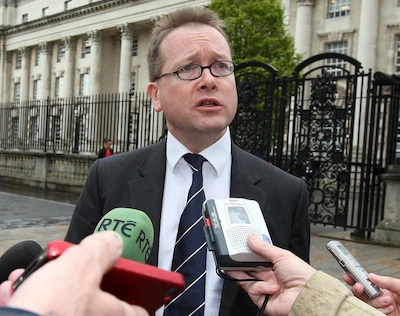
A proposal by Six-County Attorney-General John Larkin that there should be an end to prosecutions for the conflict up to 1998, the signing of the Good Friday Agreement, has drawn a sharply negative response from almost all sides.
Despite an overwhelmingly negative response from politicians and victims’ groups, Larkin has remained defiant, saying the call has fueled a debate on how the issue of the past should be dealt with.
“No minister, no MLA is engaged in what I said,” he said later. “It’s entirely my contribution, independent, to the public debate.”
He added: “I have put it out there and it’s being discussed.”
Later in the week he held talks with US mediator Richard Haass as part of a series of high-level political discussions focussing on the issues of dealing with the past, sectarian parades, and flags and symbols.
Mr Larkin was speaking as documents were being received by his office detailing the illegal and highly controversial actions of the MRF British Army death squad in the early 1970s.
But his remarks drew an immediate and near-hysterical response from unionists. Nationalists noted with concern that his comments avoided reference to the need for a truth recovery process.
Larkin’s office is tasked with advising the Six-County administration on legal matters and to supervise the rule of law in the North of Ireland, and his political interventions have previously raised eyebrows at Stormont.
The Alliance Party said the proposals were an attempt to “sweep the past under the carpet”, while Jim Allister, leader of the hardline unionist TUV, said he was “appalled and angered”.
DUP MP Jeffrey Donaldson said the proposal would set an “extremely dangerous precedent not just in the UK but across the free world”.
Alban Maginness of the SDLP said the remarks were a “cause of real concern” and victims and survivors were “entitled to justice irrespective of the lapse of time”.
Ulster Unionist leader Mike Nesbitt said he couldn’t believe he didn’t understand the “hurt and pain” he would cause amongst victims”.
A spokesperson for Relatives for Justice, which represents victims of state killings, said the proposal was “repugnant, incompatible and dangerous”.
Sinn Fein’s Gerry Adams did not condemn Mr Larkin’s suggestions but insisted a wider debate on the past was needed. He said the voices of the victims’ “must be heard and respected”.
His party colleague Gerry Kelly added that “if what John Larkin is doing is drawing a line in the sand and closing down the ability to bring out truth, then I would fundamentally disagree.”
British prime minister David Cameron also quickly moved to distance himself from Mr Larkin’s remarks, saying such a move would be “rather dangerous”.
“I do think it’s important to allow Richard Haass to do his work about parades, about flags, and about dealing with the past,” he told the House of Commons.
![[Irish Republican News]](https://republican-news.org/graphics/title_gifs/rn.gif)
![[Irish Republican News]](https://republican-news.org/graphics/title_gifs/harp.gif)

